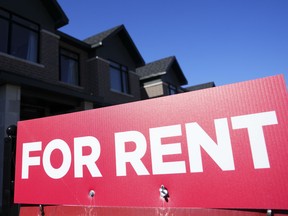
Article content
The Competition Bureau issued a warning to Canadian property managers and landlords on Wednesday about engaging in illegal agreements with competitors.
THIS CONTENT IS RESERVED FOR SUBSCRIBERS ONLY
Subscribe now to read the latest news in your city and across Canada.
- Exclusive articles from Barbara Shecter, Joe O'Connor, Gabriel Friedman, and others.
- Daily content from Financial Times, the world's leading global business publication.
- Unlimited online access to read articles from Financial Post, National Post and 15 news sites across Canada with one account.
- National Post ePaper, an electronic replica of the print edition to view on any device, share and comment on.
- Daily puzzles, including the New York Times Crossword.
SUBSCRIBE TO UNLOCK MORE ARTICLES
Subscribe now to read the latest news in your city and across Canada.
- Exclusive articles from Barbara Shecter, Joe O'Connor, Gabriel Friedman and others.
- Daily content from Financial Times, the world's leading global business publication.
- Unlimited online access to read articles from Financial Post, National Post and 15 news sites across Canada with one account.
- National Post ePaper, an electronic replica of the print edition to view on any device, share and comment on.
- Daily puzzles, including the New York Times Crossword.
REGISTER / SIGN IN TO UNLOCK MORE ARTICLES
Create an account or sign in to continue with your reading experience.
- Access articles from across Canada with one account.
- Share your thoughts and join the conversation in the comments.
- Enjoy additional articles per month.
- Get email updates from your favourite authors.
THIS ARTICLE IS FREE TO READ REGISTER TO UNLOCK.
Create an account or sign in to continue with your reading experience.
- Access articles from across Canada with one account
- Share your thoughts and join the conversation in the comments
- Enjoy additional articles per month
- Get email updates from your favourite authors
Sign In or Create an Account
or
Article content
The Bureau said it is aware that some landlords and property managers may be engaging with competitors, and while some of these discussions may be justified, others could be illegal.
Article content
Article content
“Agreements between landlords to ‘make the most of the booming rental housing market’ or ‘find ways to ensure that all players benefit from the strong demand equally’ raise concerns under the law and could be illegal,” the Bureau said in a press release.
Article content
Article content
Illegal agreements could involve rental prices, lease terms (including amenities and services) and artificially reducing the availability of rental units to restrict housing supply, the Bureau said.
Article content
By signing up you consent to receive the above newsletter from Postmedia Network Inc.
Article content
The Bureau warned that engaging in illegal agreements with competitors, “such as price-fixing, market allocation, restricting supply, or wage-fixing and no-poaching agreements,” is a criminal offence under the Competition Act, with potential prison sentences of up to 14 years and hefty fines.
Article content
It also noted that some landlords and property managers may be engaging with competitors through discussion groups on social media.
Article content
Geneviève Chassé, a Bureau spokesperson, told Financial Post in an email that the Bureau would not speculate on the prevalence of the social media groups but added that it wanted to send “a clear message to the industry” that certain topics cannot be discussed between competitors.
Article content
Dania Majid, a staff lawyer at the Advocacy Centre for Tenants Ontario (ACTO), said ACTO first became aware of such groups on platforms such as Reddit and Facebook during the COVID-19 pandemic when tenants raised concerns about potential discussions concerning bad faith evictions amid eviction moratoriums.
Article content
Article content
Majid said ACTO had come across chatter among landlords regarding lease terms and how to evict tenants during that time but added that she had not been active on these forums in a couple of years.
Article content
Read More
-

More than half of Canadian renters eager to buy
-

Lawsuit alleges rental price-fixing by companies using YieldStar
Advertisement embed-more-topic
Article content
She said these discussions on social media can help “normalize and encourage” these types of activities.
Article content
“If you’re on a forum, and everyone’s saying they’re pushing out their sitting tenants and this is how they do it … then that illegal activity … seems like standard business practice.”
Article content
Chassé told Financial Post the Bureau’s recent statement was unrelated to its investigation into algorithmic pricing in the rental housing market, which she said is still ongoing.
Article content
YieldStar, owned by Texas-based RealPage Inc., is one such example of algorithmic software that generates apartment pricing recommendations for landlords. It was the subject of a lawsuit filed by the U.S. Department of Justice (DOJ) last year, which alleged landlords were using the software to artificially inflate rents and reduce competition.
Article content
RealPage spokeswoman, Jennifer Bowcock, told Financial Post in an earlier email that the company has a history of working with the DOJ to ensure its revenue management software is legally compliant and that the department’s claims are “devoid of merit.”

.jpg) 6 hours ago
1
6 hours ago
1


 English (US)
English (US)